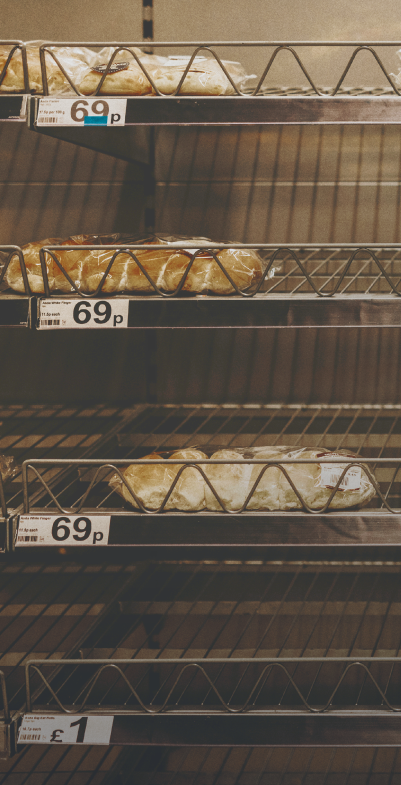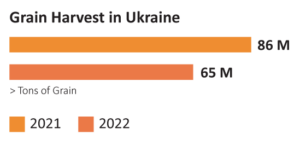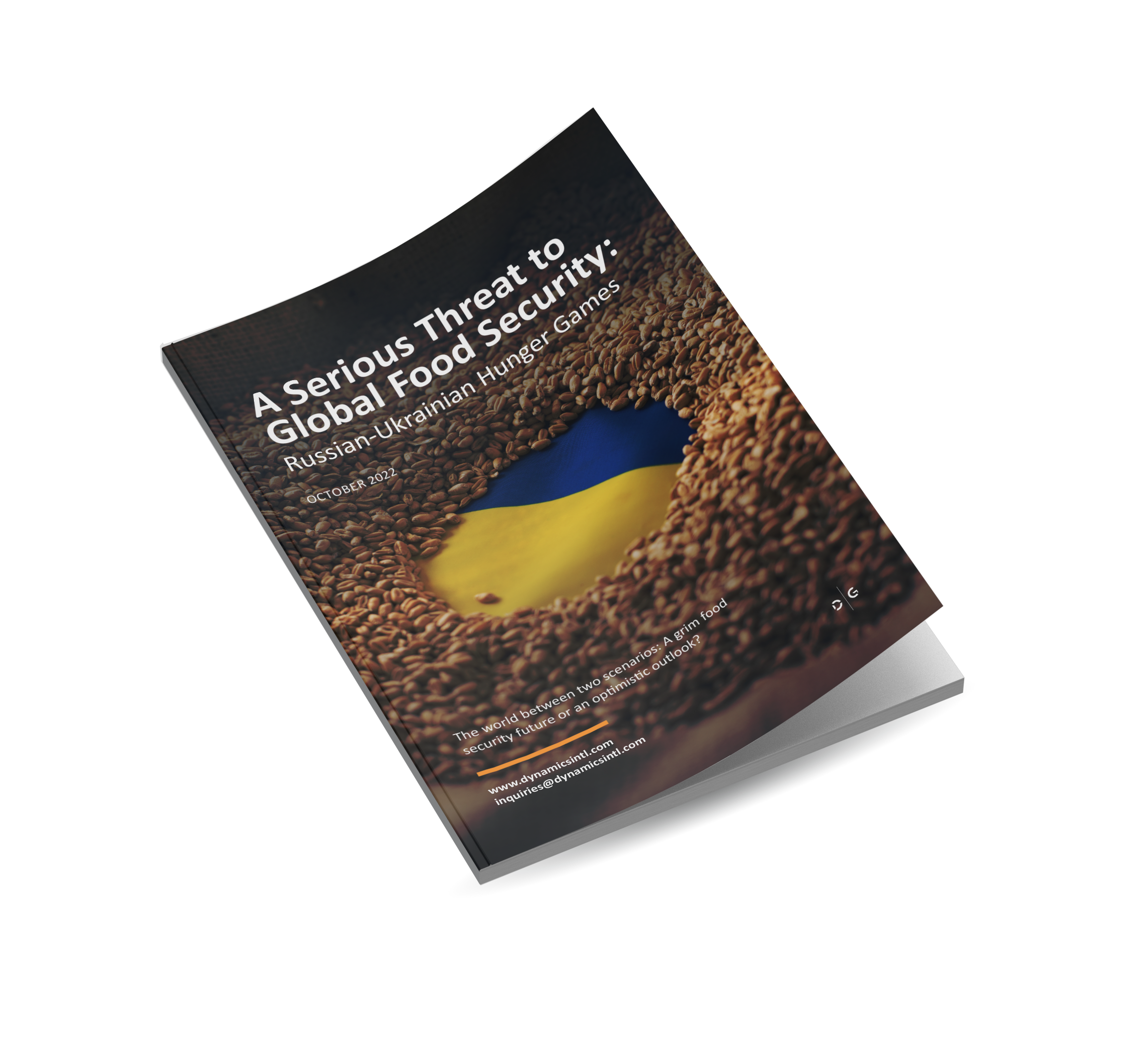The world between two scenarios: A grim food security future or an optimistic outlook?
Governments from around the world are on the verge of trepidation, fearing that an escalating famine disaster will be the new normal they will have to battle. All eyes were recently focused on Turkey’s efforts to negotiate a safe trajectory for Ukrainian grain that was finally released from the nation’s port in Odessa. Nevertheless, there is a very low probability that even such political efforts will in any way ease the Global Food Crisis that is already occurring in many African nations nor that the ongoing level of famine catastrophe will in any form be decreased.
However, it is highly likely that Global Food Security will remain at the current level of threat by the end of 2022 as a result of the Ukrainian war and the imposed sanctions against Russia, regardless of the slow resumption of grain export throughout the Black Sea. Furthermore, there is also a high possibility that the Global Food Crisis will significantly deepen and experience an increased level of threat by the beginning of 2023, due to the already ruined harvest season in Ukraine, as one of the most significant grain producers and exporters in the world.
01
A World Paralyzed: Ukrainian Grain and Global Hunger
01
A World Paralyzed: Ukrainian Grain and Global Hunger
Europe’s breadbasket has been under attack since February 2022, officially sounding the red alert for food supplies on a global level.
As soon as the Russian invasion of Ukraine began the world started panicking, as the worst predictions and scenarios were slowly becoming a reality, that the Global Food Crisis has reached unprecedented levels of threat, ones that will be very hard to subside if the current political situation persists. Ukraine currently holds 22 million tons of grain, which under normal conditions would be exported to many world countries as main food supply. Ukraine’s export power per month was about 6 to 7 million tons of grain, however due to the war conditions barely even 2 million tons of the stored grain has been exported in the past period.
Russian constant bombardment of the city of Mariupol, brought the inhabitants on the verge of a cholera crisis. Their ultimate goal which they accomplished was seizing full control of the Sea of Azov, while simultaneously blocking all the relevant ports and routes in the Black Sea. Such a geopolitical strategy from Russia affected millions of people across the world as it blocked for some the only way of importing their basic nutritional meal. Collectively, Ukraine and Russia account for a third of the global wheat and barley supply as well as hold 70% of the market for sunflower oil.
Ukraine and Russia account for a third of the global wheat and barley supply as well as hold 70% of the market for sunflower oil. Ukraine’s export power per month was about 6 to 7 million tons of grain, and now it is barely even 2 million tons has been exported in the past period.

Ukraine and Russia hold 70% of the market for sunflower oil
This war has completely decapitated all means of export from both Ukraine and Russia, leaving the world in a truly devastating condition, to account for famine, malnutrition and virtually unaffordable food and gas prices. Many solutions were proposed by various experts and politicians during the process of the blockade, corridors to key ports in the Baltic Sea that would eventually lead to Polish cities Gdansk and Gdynia, train shipments to neighboring countries with Ukraine, passages through the Danube River. Nevertheless, all of the suggested methods were extremely slow and inefficient, while the Horn of Africa was dying of hunger and drought. The most optimistic prognosis was that such alternative routes would require a fairly long-time frame possibly even years in order to export all of the accumulated grain in Ukraine currently, as opposed to using the blocked seaports through which transportation was completed much faster.
This entire war has managed to escalate the already booming Global Food Crisis around the world and create extreme market instability when it comes to prices for basic food supplies. If we take the war conflict in Ukraine as a single isolated geopolitical occurrence it has managed to have a negative impact on the global food security in every single country in the world, a ripple effect that was previously an aftermath of World War II and the Cold War.
That’s how far-reaching the implications of the Russian invasion of the Ukrainian country are and they reflect on the global food chain and the sharp climb of prices, which have escalated for a staggering 89% accounting since the corona virus pandemic began.

Climb of prices since the
corona virus pandemic began
In Somalia alone, a total of 386,000 children are suffering from malnutrition, representing the number one cause of death among the Somalian youth. This number had significantly increased compared to 340,000 children who were reported suffering from chronic malnutrition in year 2011. Somalia is only one such devastating case where famine and starvation are extinguishing the nation. Seemingly far from Ukraine, the Horn of Africa and the Middle East were extremely affected by the blocked export of grains from the Black Sea.
02
The Shipment of Ukrainian
Grain Deblocked
02
The Shipment of Ukrainian Grain Deblocked
Although the first ship Razoni carrying 26,000 tons of Ukrainian corn left the port of Odessa and sailed in the Black Sea ushering the way for more ships to follow, it will not ease the Global Food Crisis which has a crippling effect in the world
The new Joint Coordination Centre (JCC) in Istanbul was established on 27 July 2022 and as a result, the Razoni tanker which left Odessa was proclaimed as a victory in the fight against global hunger by some. However, the reality is far from one that demands rejoicing. First and foremost, the entire procedure of inspection from Russian, Ukrainian, Turkish and UN authorities will require a detailed and prolonged assessment on each ship that is carrying grain out of Ukraine.
This fact in itself will contribute for drastically slowing down the process before the produce reaches its final destination. As other ships are constantly awaiting their turn, this transportation cycle is far from its pre-war normal pace. In addition, Razoni had been maintaining an extremely cautious and slow trajectory due to the fact that there are still Ukrainian mines left in the Black Sea as a protection against Russian advances onto Ukrainian ports. One positive aspect from this entire negotiation procedure (that lasted almost 2 months and will be in effect for the next 120 days respectfully with a possibility of renewal if both Russia and Ukraine agree) is that the process of grain shipment from Ukraine has finally moved from its status quo position.
Download Report
A Serious Threat to Global Food Security: Russian-Ukrainian Hunger Games
A World Paralyzed: Ukrainian Gran and Global Hunger

Another aspect is that this landmark agreement has forced both Ukraine and Russia to find their first common ground on a specific deal since the war started. Taking into consideration that trust levels between both nations are virtually non-existent, especially after Russian military forces released missiles at the port in Odessa almost 24 hours before the final treaty was completed, this agreement is rather very fragile.
One wrong trigger can set the entire transport operation into flames. Subsequently, President Zelensky himself stated that Razoni was transporting only a minimal fraction of Ukrainian crop, ushering a highly hopeless sentiment for both the global food crisis and Kiev’s deteriorating economy.
Therefore, until 80% of the grain export process is safely completed from Ukraine onto the world, it is too optimistic to believe that the shipments of several grain carriers can ease the Global Food Crisis which is rampaging Africa and the Middle East with the speed of lightning.
Based on the latest UN statistics a staggering number of 47 million people in the world are experiencing ‘acute hunger’ as a result of the war in Ukraine and sanctions against Russia, with the potential of reaching 180 million individuals starving on a global scale. Therefore, it is a complete illusion to believe that a limited number of ships awaiting approval will be able to feed the world at the current pace, leaving extreme doubt in the success rate of the landmark agreement as interpreted by many.
Based on the latest UN statistics a staggering number of 47 million people in the world are experiencing ‘acute hunger’ as a result of the war in Ukraine and sanctions against Russia, with the potential of reaching 180 million individuals starving on a global scale. Therefore, it is a complete illusion to believe that a limited number of ships awaiting approval will be able to feed the world at the current pace, leaving extreme doubt in the success rate of the landmark agreement as interpreted by many.
Furthermore, soon after six more transport ships carrying agricultural products were approved to leave the port in Ukraine onto the Black Sea on 07 Aug 2022, the Zaporizhzhia Nuclear Power Plant was targeted in an attack. Russia denied any strike on the nuclear station accusing the Ukrainian side that the plant was struck by their own military forces. Nevertheless, according to the Ukrainian nuclear operator Energoatom, the attack damaged radiation monitors in the vicinity of the storage unit and severely injured one worker (while the grain ships were ready to move onward from the Black Sea ports in Chornomorsk and Odesa).
As mutual accusations for the nuclear strike ensued between both nations, it was confirmed that Russian military forces who have placed Zaporizhzhia’s plant (the largest one in Europe) under their authority since March (although still operated by Ukrainian technical staff) have transformed the spot into a military base. This represented a Russian tactic to use the plant as a strategic point from where they would further launch attacks against Ukrainian military forces, jeopardizing the entire region from a possible nuclear threat. Therefore, this grain agreement could possibly represent a temporary diversion act from Russian side which we have a base to suspect will only last until Russia achieves its military and strategic targets in Ukraine, extending the Global Food Crisis in the months to come.
03
Obstacles on the Way:
Major Delays in Shipment
03
Obstacles on the Way: Major Delays in Shipment
Due to major delays in shipment, Razoni was rejected by its buyer in Tripoli, making the situation even more complex when it comes to eliminating the threat to global food hunger.
The highly anticipated first ship had reached yet another obstacle. Namely, after the ship-tracking data showed an abrupt change in the final destination from Tripoli ‘to order’ it was clear that the shipment is looking for a new potential buyer. According to the Ukrainian Embassy in Lebanon, the Razoni was rejected from a private Lebanese buyer due to its 5-month delivery delay as it was supposed to be shipped soon after the Russian military invasion of Ukraine began. The Lebanese Ministry of Economy and the government distanced themselves from the problem as they stated that the national authorities cannot be accountable for private businesses and buyers of imported goods, nor will they interfere in the private sector when it comes to commercial purchases.
This newly emerged challenge only highlights the difficulties that such shipments will encounter due to their extreme delay, forcing private buyers to find alternative ways as the level of uncertainty pertaining to when Ukrainian grain will be available on the market is a great dilemma for the entire world.
These long delays have become a huge problem for both Ukrainian exporters and potential buyers who were forced to find cheaper alternative ways to continue with their business. Such complications only signal that although the shipment process of Ukrainian grain has finally been deblocked many challenges lie ahead, not to mention the disappointment and sentiment of failure felt by many parties involved pertaining to the entire course of action and signed agreement. Many months will be needed to bring back the shipment process and the unrestricted purchase of Ukrainian grain to a certain level of normalcy, if possible. However, all of this signifies one more setback in the tumultuous process of securing food for the nations of the world, contributing for the level of threat to remain intact when it comes to the Global Food Crisis.
04
Brewing Social
Unrest
04
Brewing Social Unrest
Spiraling prices and depletion of basic food supplies has contributed for the start of social unrest, class struggle and destabilization around the world signaling even greater political disruption and deepened Global Food Crisis.
Countries with fragile economies, faced with shortages of food and heightened inflation prices have been subjected to extremely difficult living conditions. Sri Lanka for instance had widespread protests and social unrest, where the people blamed the government for corruption, the largest debt crisis, incompetent governance and inadequate spending, forcing the President to flee the country in the midst of a national coup. It cannot be contested that the war in Ukraine had an effect on the skyrocketing prices of food, shortage of gas, no medicine and overall unbearable living conditions.
The social unrest is escalating in other countries that were dependent on Ukrainian wheat and Russian oil, such as in the Middle East and the Horn of Africa. The revolt against political officials who are unable to provide some form of relief for its citizens is reaching its pinnacle, bringing the level of dissatisfaction and anger among people so high that according to previous trends it might supersede the Arab Spring protests which occurred over 10 years ago.
In Africa, the struggle is only intensifying, where the Head of the African Development Bank commented on the shortage of wheat due to the war in Ukraine stating that if the problem is not placed under control within a reasonable time frame, it has the effect of destabilizing the entire African continent. Countries like Egypt and Tunisia are struggling to feed the masses, where the public is mobilizing and calling for political action under the slogan ‘revolution of the hungry.’ Protests in Tunisia have been far from pleasant, intensifying in the scale of the rebellion and the number of protesters. Sudan, the Democratic Republic of Congo and South Africa have seen social anger for rising prices and hunger reach a boiling point in the past period coupled with other political issues. Iraq as well experienced serious food riots threatening further stability in the region.
The world is witnessing a mass political and social upheaval against food shortages, resulting in a global class struggle.
Let us not forget that between the years of 2007 to 2008 and 2010 to 2012, when the world was faced with increased global food prices (at a much smaller magnitude and level of threat than the one occurring today) was the trigger for political revolutions that ensued shortly in the Middle East. The political destabilization of nations such as Sri Lanka, Burkina Faso and Chad and the mass riots occurring simultaneously in Kenya, Pakistan, Mali and Peru represent an indication that the Global Food Crisis will not be eliminated without major political movements, coups and fallen national governments, as these two factors are closely intertwined.
05
The Devastation of Ukrainian Farmland
& Global Food Crisis
05
The Devastation of Ukrainian Farmland & Global Food Crisis
Ukraine’s farmlands are being bombed by Russian military forces and silos are deliberately being hit by missiles, completely ruining the chances of a decreased level of threat to food security in the world.
Eyewitnesses have claimed that Russia has been aiming to destroy Ukraine’s full agricultural infrastructure in order to completely decapitate its economy and drive it to a state of servitude. Satellite videos have been used as evidence to detect missiles directly being aimed at silos storing over 30,000 tons of grain and bombings of animal farms to cut the milk production chain.
Other grain storage facilities were also targeted by Russian air strikes which according to security footage cameras were so precise and aimed at complete destruction of the storage units, it is impossible that they were not previously planned. Furthermore, on 16 May 2022, Russian air strikes on Kharkiv managed to completely destroy the Yuriev Institute which was a home to the National Gene Bank of plants in Ukraine. These attacks demolished thousands of valuable sample seeds stored in the Institute.
Another reason for such deliberate destruction of Ukraine’s harvest capabilities and overall complete production of grain is not only to weaken Ukraine’s economy but also to make the world dependent on Russia’s grain supply. Through such actions Russia will manage to eliminate its competitor when it comes to grain production. With the continuation of such military strategy the world will be suffering in hunger with no possibility of closing the gap when it comes to the Global Food Crisis.
Subsequently, major evidence resurfaced that Russian military forces have been stealing Ukrainian grain and farming machinery, while derailing trucks filled with wheat and corn onto the Russian border. Alleged satellite images in May 2022 highlighted how Russian ships were loading Ukrainian grain and taking it to Syria for resale, after countries like Egypt and Lebanon adamantly refused to purchase the produce. Russian military vehicles were spotted transferring farming machinery including tractors from the city of Melitopol to Chechnya. It was further argued that the Russian military has managed to rob a total of 5 million dollars’ worth of agricultural equipment.
Furthermore, the Ukrainian Ambassador to Turkey, Vasyl Bodnar claimed that Russians were explicitly taking Ukrainian grain and loading it to ships in Crimea, ready for export.

The Ambassador specified that after making an official request to the Turkish government for assistance, Turkey alongside Interpol were collaborating together to find the criminals responsible behind the entire ordeal. Also, in the region of Zaporizhzhia which is under Russian authority, inhabitants have been exporting grain to the Middle East and Turkey, going through the territory of Russia first as a primary channel.
06
The Next Harvest Season in
Ukraine Ruined
06
The Next Harvest Season in Ukraine Ruined
Ukrainian farmers are predicting an even dire future for the supply of grain in the world as this year’s production and harvest season have been completely halted by war and Russian shelling.
According to official statistics delivered by the Ukrainian Ministry of Agriculture, the nation harvested a total of 86 million tons of grain in 2021 including wheat and corn. An optimistic estimate by the Ukrainian government is that the harvest for year 2022 will inevitably drop to 65 million tons of grain. As farmers are combating Russian military forces and harvesting simultaneously, the Ukrainian military has ordered that all storages of fuel intended for agricultural machinery be given for the battles against Russia as an ultimate priority in the war.

Therefore, farmers are left with no additional diesel to be used for their harvesting equipment, leaving their fields unplowed. The backed-up reserves of grain are left to rot in silos all over Ukraine as the world battles the new political situation, famine and the shortage of food supplies. When statistically analyzed, the differences from previous years and the negative effects of this year will be far reaching, overriding the temporary enthusiasm of opened corridors for shipment.
According to many agrarian experts, the quality of Ukrainian grain stored in silos during wartime with possible exposure to explosive devices has been brought into question, ruining hopes for any possible reduction of the Global Food Crisis. The main prerequisites for the safe storage of wheat and corn demand a precise moisture content, clear protection from insects, water access, allowing the grain to be completely dried in a specially designated storage facility that cannot be overloaded.
Meanwhile, conditions for a safe and proper disinfestation to be completed in the case insects enter the space must be managed. Taking all of this into consideration, there is no doubt that the storing conditions for Ukrainian grain in the past period have been less than normal, with major shelling and destruction occurring on a daily basis.
Download Report
A Serious Threat to Global Food Security: Russian-Ukrainian Hunger Games
A World Paralyzed: Ukrainian Gran and Global Hunger
Farmers have had limited working conditions, unable to secure the proper storage for their crops, due to backed up amounts that were stuck in Ukraine for the past 6 months, prompting the produce to be exposed to negative effects of military equipment, constant bombardment and possible nuclear threats.
Furthermore, the quality of the next wheat harvest under such terrible living conditions in many regions in Ukraine leaves the doubt that grain production in the near future will not reach its full capacity and the already stored grains in overfloating Ukrainian silos have been subjected to extraordinary wartime storage conditions, definitely impacting their overall quality.
07
A Deliberate Murder of the Ukrainian
Grain Tycoon
07
A Deliberate Murder of the Ukrainian Grain Tycoon
The murder of Oleksiy Vadatursky, the Ukrainian grain magnate by Russian military forces, a day before the first grain ship was to pass through the Black Sea is viewed as a direct attack on Ukraine’s export and food production.
Vadatursky was valued as the grain father of Ukraine, elevating the nation as one of the key exporters of wheat in the world. After a Russian missile directly hit the house of Vadatursky and his wife located in the city of Mykolaiv, Ukrainian authorities were not convinced that this was a mere coincidence. Rather, they believed that this deliberate attack was part of the Russian strategy to further stop the process of Ukrainian grain export and production, which would ultimately signify a prolonged threat to the Global Food Crisis. Vadatursky was respected as an honest man with a clean reputation unlike many Ukrainian oligarchs. Most importantly, his companies had ownership of over a million acres of agricultural land with rich soil for production in 10 regions across Ukraine.
Apart from growing wheat and producing sunflower oil, Vadatursky had a shipyard where he built carriers transporting millions of tons of grain per year. In addition, the ships that he manufactured were also utilized by the Ukrainian navy because of their durability. Before being killed by a Russian missile, Vadatursky was focused on finding a solution and ways to resume the export of Ukrainian grain, which represented a problem for Russian authorities.
The direct hit to his bedroom where Vadatursky was at the moment with his wife, revealed that his death was previously planned by Russian forces and was too precise to represent a mere collateral damage of the war. Vadatursky’s death for many was precalculated as Russian authorities were looking to stall the process of Ukrainian grain export in any way possible.

Another interesting fact resurfaced that in year 2018, Vadatursky was placed on the Russian blacklist alongside 322 other Ukrainian citizens and now was the opportunity for his premeditated elimination.
Although Vadatursky’s companies will not bankrupt or stop functioning immediately, his death will have a major negative effect and cause a huge delay in the entire process of transportation, export and grain production which was Russia’s ultimate goal. It is also very symptomatic that he was targeted 24 hours before the first grain shipment was to leave the port in Odessa.
08
Hunger as a Powerful
Political Weapon
08
Hunger as a Powerful Political Weapon
The weaponization of hunger as a political method of blackmail for Russia, will only maintain the current level of threat in relation to the Global Food Crisis.
Since the production and export of wheat as well as other agricultural products represents one of the key driving forces of the Ukrainian economy (equaling up to 40%), the Russians have used the blockade of the Black Sea ports as a wartime strategy to completely deteriorate Ukraine’s economic stability and its GDP. Russian authorities have weaponized hunger and have made an entire wartime tactic to target key grain warehouses in Ukraine and completely destroy the fertile land, bringing Ukrainian farmers on the verge of bankruptcy. Food has always represented a powerful political tool in maintaining national interest and Russia’s political goal of economically destroying Ukraine and impoverishing the nation to its last reserve is a full-fledged operation that can be determined each day by the actions of the Russian military.
Therefore, taking into consideration that the Kremlin has so far manipulated the global food crisis, not only by blocking Ukrainian grain to exit the country but also by destroying all the resources for future wheat production, it is highly unlikely that Putin will give up this political strategy as one of his key weapons in abolishing Ukrainian statehood. As such, this brings a dose of unprecedented skepticism that the maritime agreement managed by Turkey will have a long-term effect.
Meanwhile, the skepticism intensifies surrounding this entire diplomatic procedure, as Russian military forces continue bombing the port in Odessa, transportation lines and grain resources in Ukraine.

Another aspect for consideration is the fact that Russia has turned this entire political scenario into a complex psychological war with the world, depriving nations of essential food supplies, as a response to the global sanctions imposed against the Kremlin at the start of the invasion. One statement best describes Russia’s game with the world and its blockade on grain export through the words of the former President and Prime Minister Dmitry Medvedev, now serving as the Deputy Chairman of Russia’s Security Council.
In April 2022 Medvedev stated on Telegram that “food is the Kremlin’s silent but menacing weapon.” He specifically underlined that Russia does not want to deliver agricultural products to its enemies and opponents who have openly imposed sanctions on the nation, signaling a highly distressing realization that the idea of starvation is linked to Russia’s political interest.
09
The Importance of Russian Grain
on the Global Market
09
The Importance of Russian Grain on the Global Market
However, we must not underestimate the value of Russian grain on the world’s market which due to the imposed Western sanctions has made the process of export even more difficult to occur, partially sealing the Russian market for grain on the global stage as well.
Just in year 2021, Russia gained $11 billion from the export of grain, accounting as one of the most relevant grain exporters in the world. In many instances, the Russian government has claimed that the imposition of Western sanctions against the nation, its shipping industry and its banks have made the entire process of exporting Russian grain onto the world very difficult. Many renowned shipping companies have already stopped collaborating with the Russian government as well as Russian oligarchs and blocked potential export or import deals to Russia.
Another main reason for the ceased cooperation between global shipping companies and Russian exporters is the fact that their insurance packages have grown significantly high, to a virtually unaffordable level due to the entire geopolitical situation and instability in the exact region of the Black Sea. The positioned mines by the Ukrainian side had a major contribution to the heightened maritime insurance policies. The same applied to the Ukrainian side, where shipping companies demanded an insurance premium of up to $200,000 to $270,000 per week of average cost for shipments crossing even the safe corridor.
Subsequently, the fact that Russian transactions were placed on hold in Western and American banks and the dispensation of payments for Russian citizens in foreign banks was problematic, owners of large shipping companies are practically prevented from doing business with Russian oligarchs or the Kremlin, as it is virtually impossible to conduct the transaction and payment process.
Therefore, Russia as another key exporter of corn and sunflower oil in the world is unable to ship its products to its main business partners around the world. On 11 Aug 2022, Russia had urged the West to fully abide according to the signed Istanbul agreement, which specified as a condition the promotion and export of Russian grain and fertilizers in the world. Moscow was firmly demanding that this condition be respected and implemented, as it appears the Russian economy has found itself in a difficult position with all the imposed sanctions. The current situation with halted Russian export of wheat, corn and fertilizers only signifies that the Global Food Crisis will remain at its current level of threat in the near future.
10
A grim food security future
or an optimistic outlook?
10
A grim food security future or an optimistic outlook?
There are many concerns whether increased grain export through the pre-arranged safe corridor in Turkey would provide any relief to the escalating Global Food Crisis.
Not to mention the political fragility that surrounds this temporary agreement which can easily blow into flames if both Russia and Ukraine become tired of diplomatic courtesy. Even if the majority of Ukrainian grain is exported in the period that follows, there is no certain guarantee that food prices would fall and that there would be sufficient supply of wheat and corn to feed the already starving children of the world, as some decisions were made too late while hunger was being politicized.
Russia’s valuable export of fertilizers and corn has also been stopped due to economic sanctions, only worsening hunger and malnutrition among African and Middle Eastern nations. Leveraging between Ukraine and Russia and facing a new ruined harvest season in the most fertile Ukrainian lands as the war progresses, it appears as the Global Food Crisis is here to stay long-term.
Many governments in the world will start to feel the social repercussions of the grain shortages and heightened prices experiencing political turmoil and coups. Sri Lanka will not represent an isolated case where the drastic gap between social classes will only intensify and lead to overthrowing of incapable governments in the world and heightened class struggle among the masses.

Although many nations have found alternative means of food supply or new exporters of grain in their regions, the consequences of the Ukrainian war on the Global Food Crisis will be felt in the following period to come, even after the world reaches a certain level of stabilization. It is too optimistic to believe that global famine and high inflation will be reduced amid the increased flow of cargo ships through the Black Sea. We must not forget that grain ships are still experiencing unsecure buyers and major delays in their delivery time. There is a very low probability that even such political efforts will completely ease the Global Food Crisis.
Instead, a more realistic scenario is that the grain crisis will remain at the current level of threat in the next period.
Furthermore, there is also a high possibility that the Global Food Crisis will experience an increased level of threat, due to the already ruined harvest season in Ukraine and the questionable quality of the grain that is being stored under wartime conditions as the conflict continues. One thing is certain, the world cannot afford to take a 6-month break from feeding its population, as Russia and Ukraine represent one of the most relevant breadbaskets in Europe, Middle East and Africa.

ARTICLE | 19 PAGES




